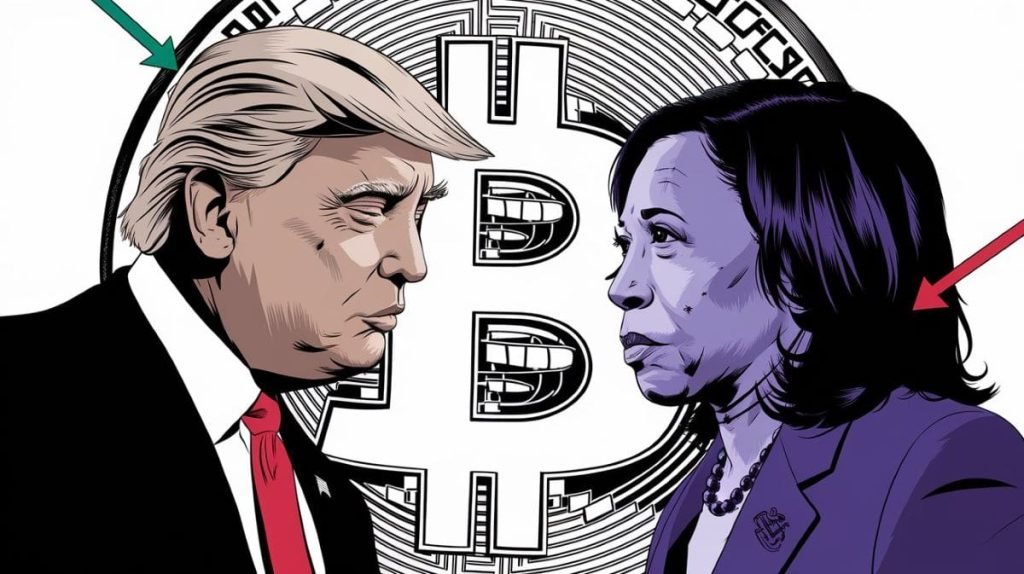- Republican Senate control likely, potentially favoring crypto-friendly regulations.
- Both parties show increased interest in digital assets legislation.
- Bitcoin ownership higher among Democrats, despite Republican policy support.
- Trump and Harris differ on crypto approach, with Trump more openly supportive.
- Election outcome uncertain, with divided government a strong possibility.
In a political landscape where cryptocurrency is gaining unexpected traction, the 2024 U.S. elections are shaping up to be a pivotal moment for the digital assets industry.
As candidates vie for votes, their stance on crypto has become a surprisingly significant factor in their campaigns.
According to recent data from Grayscale Research, about half of likely American voters are more inclined to support candidates who stay informed about cryptocurrency.
This shift in voter preference has pushed the digital assets industry into the spotlight, demanding attention from politicians on both sides of the aisle.
The Senate: A Crypto Battleground
While the race for the White House remains tight, prediction markets suggest a high likelihood of Republican control in the Senate.
This potential power shift could have far-reaching implications for the crypto industry, given the Senate’s crucial role in confirming key regulatory appointments.
“Republican control may be considered a net-positive outcome for crypto, given the Senate’s key role in confirming regulator appointments,” notes Grayscale Research.
The “Stand With Crypto Alliance“, an industry lobbying group, reports that 39 out of 49 Republican senators receive an “A” grade on crypto issues, compared to only 6 out of 51 Democratic senators.
This stark contrast highlights the potential impact of a Republican-controlled Senate on future crypto regulations.
Presidential Candidates: Diverging Crypto Visions

The race for the White House presents two distinctly different approaches to cryptocurrency.
Former President Trump has enthusiastically embraced digital assets, declaring his intention to make the U.S. “the world capital for crypto and Bitcoin.”
He’s even announced plans to launch a crypto lending platform called World Liberty Financial.
In contrast, Vice President Harris has taken a more cautious stance.
While recently expressing support for “innovative technologies like AI and digital assets,” her administration’s track record includes what some in the industry view as an adversarial approach to oversight.
The Bipartisan Paradox
Interestingly, at the constituent level, crypto appears to be a bipartisan issue.
Surveys conducted by The Harris Poll on behalf of Grayscale reveal higher levels of Bitcoin ownership and crypto familiarity among self-identified Democrats compared to Republicans.
This data presents a curious disconnect between voter preferences and political party stances, adding another layer of complexity to the election’s potential impact on the crypto industry.
Economic Implications
Beyond direct crypto policies, the election’s outcome could have broader economic implications that indirectly affect digital assets.
Both candidates’ fiscal policies are projected to increase budget deficits, which Grayscale Research suggests could be positive for Bitcoin in the medium term.
However, the possibility of increased tariffs under a Trump administration introduces uncertainty, potentially affecting broader financial markets and, by extension, crypto asset valuations.
Check Also: Bitcoin Could Surge to $125,000 if Trump Wins 2024 Election, Standard Chartered Predicts
Looking Ahead
As the election approaches, the crypto industry finds itself at a crossroads. While bipartisan support for comprehensive legislation seems to be growing, the outcome of the 2024 elections could significantly influence the regulatory landscape.
With eight distinct possible scenarios for control of the White House, Senate, and House of Representatives, the future of crypto regulation in the U.S. remains uncertain. What is clear, however, is that cryptocurrency has firmly established itself as a political issue that candidates can no longer ignore.
As voters head to the polls, they’ll be deciding not just on traditional political issues, but also on the future of digital finance in America. For crypto enthusiasts and investors, the stakes have never been higher.
Previous Articles:
- Arkham Intelligence to Launch Crypto Derivatives Exchange in November 2024
- Celebrate Dogecoin with Big Bonuses, Rewards and Epic Airdrop before Doge2014 Presale Ends
- Uniswap Labs Launches Unichain: A New Frontier for DeFi Transactions
- ABDS Token Receives Top CertiK Badge for KYC
- The Human Element: Why Human Oversight Remains Key in AI Trading
